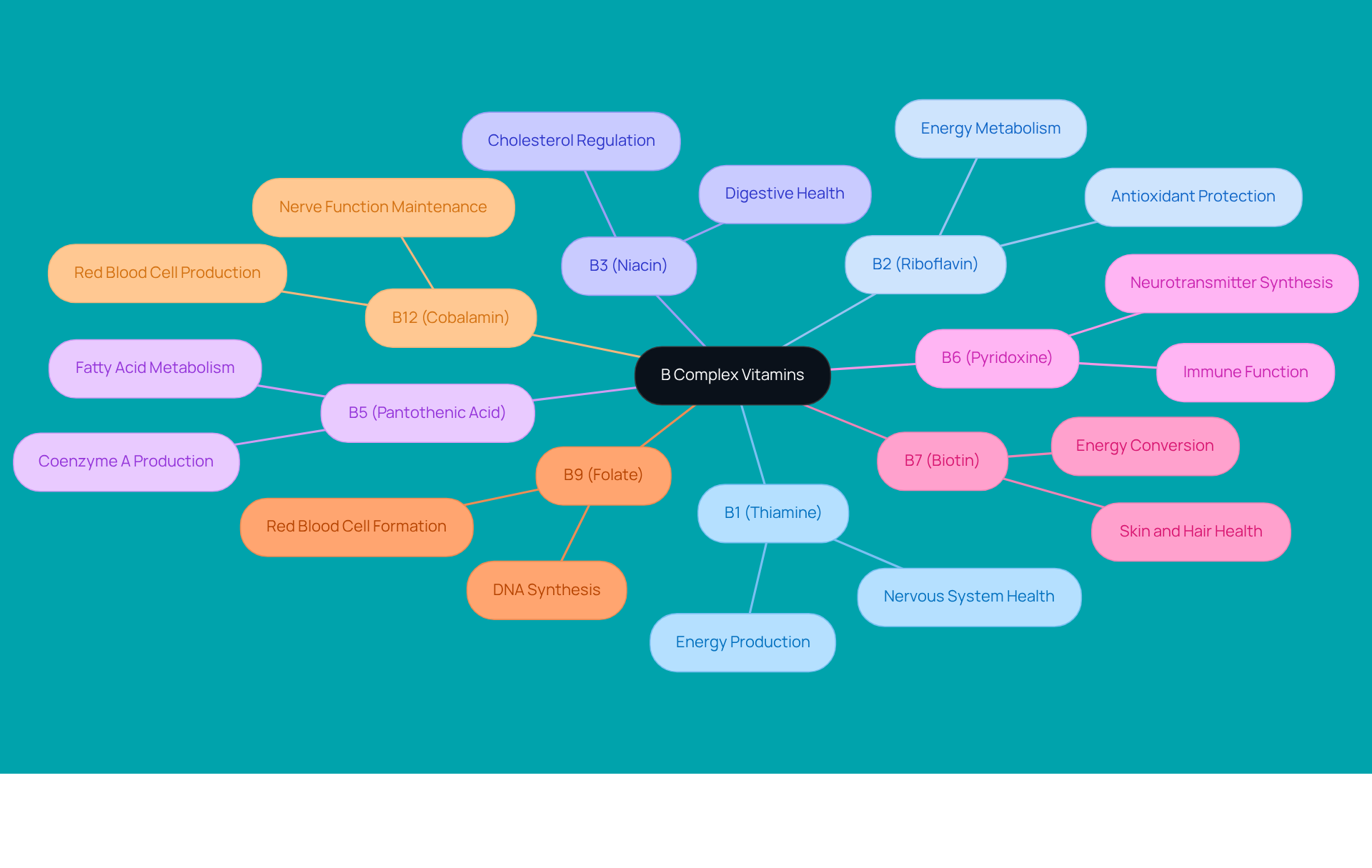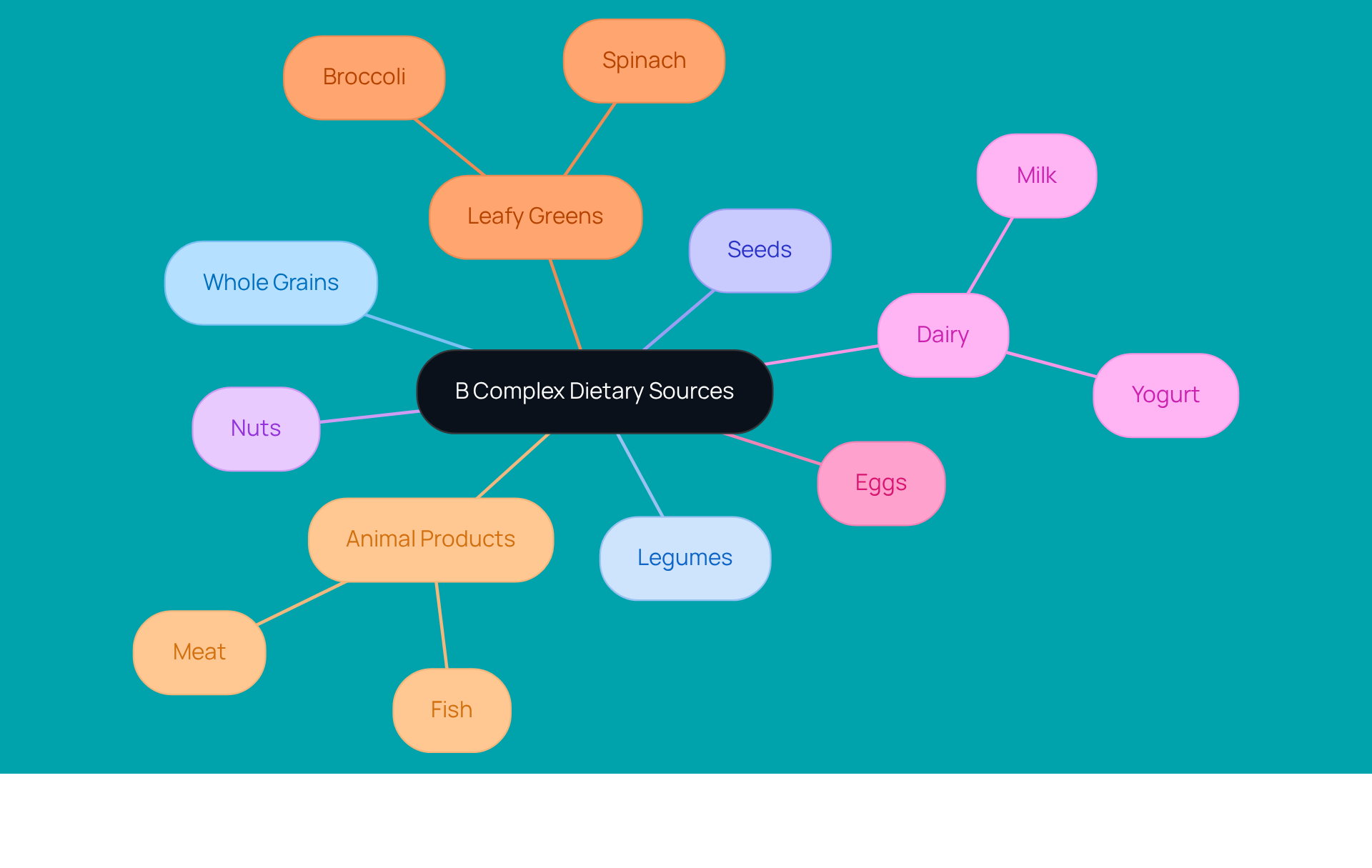Overview
The B Complex vitamins play a vital role in our daily lives, supporting energy metabolism, brain health, and overall well-being. Imagine if you could harness the power of these essential nutrients to feel more energized and mentally sharp. These vitamins are crucial for:
- Converting the food we eat into energy
- Synthesizing neurotransmitters that help regulate our mood
- Preventing deficiencies that can lead to cognitive decline and mental health challenges
You might be wondering how these vitamins can fit into your life. By including B Complex vitamins in your balanced diet, you can take a significant step toward enhancing your wellness journey. Remember, every small change counts, and prioritizing these nutrients can make a difference in how you feel day-to-day.
Together, let’s embrace the importance of B Complex vitamins and consider how they can contribute to a healthier, happier you. Your well-being matters, and making informed dietary choices is a powerful way to support your journey.
Introduction
B Complex vitamins are often overlooked, yet they play a crucial role in maintaining our overall health and wellness. This group of eight essential nutrients not only supports energy metabolism but also significantly contributes to brain function, mood regulation, and skin health. You might be wondering about the potential consequences of deficiencies, and how to effectively incorporate these vital vitamins into your diet to enhance your well-being. Exploring the composition, benefits, and dietary sources of B Complex reveals a pathway to a healthier lifestyle together.
Define B Complex: Understanding Its Composition and Functionality
B Complex encompasses a set of eight essential water-soluble nutrients, each playing a vital role in various bodily functions. These supplements include:
- B1 (thiamine)
- B2 (riboflavin)
- B3 (niacin)
- B5 (pantothenic acid)
- B6 (pyridoxine)
- B7 (biotin)
- B9 (folate)
- B12 (cobalamin)
Each nutrient uniquely contributes to crucial processes such as energy production, red blood cell formation, and neurotransmitter synthesis. For instance, imagine if you could convert carbohydrates into energy more efficiently; thiamine makes that possible. Meanwhile, riboflavin acts as a protective antioxidant, shielding our cells from oxidative stress. Niacin supports our digestive system and skin health, while pantothenic acid is key for producing coenzyme A, which helps in fatty acid metabolism.
Together, these B nutrients are fundamental for maintaining a healthy metabolism, supporting brain function, and promoting skin wellness. You might be wondering about the impact of deficiencies—studies indicate that a lack of these nutrients can lead to , including reduced cognitive abilities and an increased risk of chronic illnesses. Research has shown that adequate B nutrient levels are associated with improved brain performance and may help slow cognitive decline as we age. Furthermore, these nutrients assist in producing neurotransmitters, which are essential for regulating mood and overall mental health.
While many of us can obtain sufficient B nutrients through a varied diet, certain groups—such as expectant mothers, individuals on restrictive diets, or those with gastrointestinal issues—may require additional support to meet their nutritional needs. It's important to recognize that by the ages of 75-80, approximately 40% of individuals experience a decreased ability to absorb food-bound B vitamins, potentially leading to nerve function decline and an increased risk of dementia. Additionally, excessive intake of folic acid beyond 1,000 mcg daily can have negative effects, underscoring the importance of balanced consumption. Understanding the structure and roles of B Vitamins is essential for appreciating their significance in a balanced diet and overall health. Together, let’s take steps toward ensuring our wellness through mindful nutrition.

Explore Health Benefits: Why B Complex Matters for Your Well-Being
The advantages of complejo b para que sirve are extensive and multifaceted, as it plays a crucial role in energy metabolism by converting carbohydrates, fats, and proteins into usable energy. These nutrients are essential for preserving a , aiding in the creation of neurotransmitters that control mood and cognitive function. Imagine if you could support your mental well-being simply by ensuring you get enough of these vital nutrients. Remarkably, vitamins B6 and B12 are especially important; shortages of these nutrients have been linked to heightened risks of depression and anxiety.
Additionally, B vitamins contribute to skin wellness by encouraging cell regeneration and restoration. You might be wondering how much you need. Studies suggest that increased consumption of B nutrients, particularly:
- B1 (1.1 mg for women, 1.2 mg for men)
- B2 (1.3 mg)
- B6
can greatly enhance several wellness metrics, including energy levels and mood. However, it's important to be aware of the potential risks associated with high doses of B vitamins, particularly B3 (niacin) and B6, which can lead to serious side effects.
Overall, incorporating B vitamins into your diet can lead to enhanced energy, improved mental health, and better skin health, highlighting what complejo b para que sirve. Together, let's make B vitamins a vital component of our holistic wellness approach. By taking this step, you’re not just nourishing your body; you’re investing in your overall well-being.

Identify Dietary Sources: How to Incorporate B Complex into Your Nutrition
Incorporating B Complex into your nutrition is not only beneficial but can be easily achieved through a variety of dietary sources. Imagine nourishing your body with foods abundant in B nutrients like:
- Whole grains
- Legumes
- Seeds
- Nuts
- Dairy items
- Eggs
- Leafy greens
For instance, did you know that spinach and broccoli are excellent sources of folate (B9)? Meanwhile, animal products such as fish, meat, and dairy provide significant amounts of B12, essential for your health.
You might be wondering about the difference in absorption rates. It’s important to note that folic acid, the synthetic form of folate, is absorbed at a rate of 85%, compared to just 50% for folate from food sources. Furthermore, fortified foods like breakfast cereals and plant-based milk options can be incredibly beneficial, especially for those of us adhering to vegetarian or vegan lifestyles. As Elizabeth Barnes, RDN, wisely mentions, "Obtaining sufficient B nutrients is simple, even for those adhering to a plant-based eating plan."
By focusing on a varied and balanced nutrition that incorporates these foods, we can ensure that we obtain sufficient quantities of B Complex, which is crucial for promoting overall wellness and well-being. Research indicates that B nutrients may even help lower the risk of certain types of cancer and heart disease, further emphasizing their significance in a healthy diet. Including sources like shellfish can also enhance your vitamin B intake, offering additional health benefits.
Together, let’s embrace a lifestyle that prioritizes our health and well-being through mindful nutrition choices. Your journey towards better health starts with understanding [complejo b para que sirve](https://nutritionsource.hsph.harvard.edu/vitamins/vitamin-b) in your diet.

Conclusion
B Complex vitamins are essential nutrients that play a pivotal role in maintaining overall health and well-being. By understanding their unique contributions, we can see how these eight vitamins work synergistically to support energy production, brain function, and skin health. The significance of B Complex extends beyond mere dietary supplements; it is a foundation for a balanced and healthy lifestyle.
This article highlights the individual functions of each B vitamin, emphasizing their importance in energy metabolism, cognitive health, and emotional well-being. For instance, thiamine plays a crucial role in converting carbohydrates into energy, while vitamins B6 and B12 significantly impact mood regulation. Each nutrient is vital for optimal bodily functions. Moreover, it addresses the dietary sources of these vitamins, encouraging the inclusion of whole grains, legumes, and leafy greens in our daily meals to ensure adequate intake.
Incorporating B Complex into our diet is not just about preventing deficiencies; it is an investment in long-term health. By prioritizing these vital nutrients, we can enhance our energy levels, support mental clarity, and promote skin vitality. Imagine embracing a diet rich in B vitamins as a proactive step toward achieving holistic wellness. This underscores the importance of mindful nutrition choices for a healthier future. Together, let’s take this journey toward better health, ensuring that we nurture ourselves with the nutrients we truly need.
Frequently Asked Questions
What is B Complex?
B Complex refers to a set of eight essential water-soluble nutrients that play vital roles in various bodily functions. These include B1 (thiamine), B2 (riboflavin), B3 (niacin), B5 (pantothenic acid), B6 (pyridoxine), B7 (biotin), B9 (folate), and B12 (cobalamin).
What functions do the B vitamins serve in the body?
Each B vitamin contributes to crucial processes such as energy production, red blood cell formation, and neurotransmitter synthesis. For example, thiamine helps convert carbohydrates into energy, riboflavin acts as an antioxidant, niacin supports digestion and skin health, and pantothenic acid is important for fatty acid metabolism.
How do B vitamins impact mental health and cognitive function?
Adequate levels of B vitamins are associated with improved brain performance and may help slow cognitive decline with age. They assist in producing neurotransmitters, which are essential for regulating mood and overall mental health.
Who might need additional B vitamin support?
Certain groups, such as expectant mothers, individuals on restrictive diets, or those with gastrointestinal issues, may require extra support to meet their B vitamin needs.
What are the risks associated with B vitamin deficiencies?
Deficiencies in B vitamins can lead to negative effects on well-being, including reduced cognitive abilities and an increased risk of chronic illnesses.
How does age affect the absorption of B vitamins?
By the ages of 75-80, approximately 40% of individuals may experience a decreased ability to absorb food-bound B vitamins, which can lead to nerve function decline and an increased risk of dementia.
Is there a risk of consuming too much folic acid?
Yes, excessive intake of folic acid beyond 1,000 mcg daily can have negative effects, highlighting the importance of balanced consumption of B vitamins.




